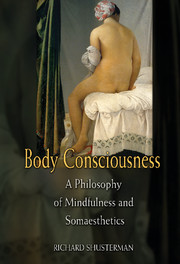Book contents
- Frontmatter
- Contents
- Preface
- Introduction
- 1 Somaesthetics and Care of the Self: The Case of Foucault
- 2 The Silent, Limping Body of Philosophy: Somatic Attention Deficit in Merleau-Ponty
- 3 Somatic Subjectivities and Somatic Subjugation: Simone de Beauvoir on Gender and Aging
- 4 Wittgenstein's Somaesthetics: Explanation and Melioration in Philosophy of Mind, Art, and Politics
- 5 Deeper into the Storm Center: The Somatic Philosophy of William James
- 6 Redeeming Somatic Reflection: John Dewey's Philosophy of Body-Mind
- Select Bibliography
- Index
6 - Redeeming Somatic Reflection: John Dewey's Philosophy of Body-Mind
Published online by Cambridge University Press: 05 June 2012
- Frontmatter
- Contents
- Preface
- Introduction
- 1 Somaesthetics and Care of the Self: The Case of Foucault
- 2 The Silent, Limping Body of Philosophy: Somatic Attention Deficit in Merleau-Ponty
- 3 Somatic Subjectivities and Somatic Subjugation: Simone de Beauvoir on Gender and Aging
- 4 Wittgenstein's Somaesthetics: Explanation and Melioration in Philosophy of Mind, Art, and Politics
- 5 Deeper into the Storm Center: The Somatic Philosophy of William James
- 6 Redeeming Somatic Reflection: John Dewey's Philosophy of Body-Mind
- Select Bibliography
- Index
Summary
Though his sober, logical temperament was not prone to fervent hyperbole, John Dewey passionately exalted the human body as “the most wonderful of all the structures of the vast universe.” His Experience and Nature celebrates “body-mind” as an essential unity in which mental life emerges from the body's more basic physical and psychophysical functions rather than being superimposed on the soma by transcendent powers of reason emanating from a spiritual world beyond nature (LW1:199–225). Contesting the “contempt for the body, fear of the senses, and the opposition of flesh to spirit” that sadly dominates philosophy (even in the sensory field of aesthetics), Dewey's Art as Experience insists that “biological” factors form the “roots of the esthetic” and thus shape even our most spiritual experiences of fine art and imaginative thinking (LW10:20, 26).
Dewey, however, was not always so appreciative of the biological body. He began his career as a neo-Hegelian idealist, affirming a transcendent soul in contrast to the body and giving clear primacy to soul or spirit as the essential shaping force of life. Rather than understanding mind as emerging from bodily existence, he viewed the human body as the emergent creation and tool of a transcendent soul that makes itself immanent in the body in order to use it. In an 1886 essay, “Soul and Body,” he claims, “The body is [the soul's] organ only because the soul has made the body its organ … The body as an organ of the soul is the result of the informing, creating activity of the soul itself.
- Type
- Chapter
- Information
- Body ConsciousnessA Philosophy of Mindfulness and Somaesthetics, pp. 180 - 216Publisher: Cambridge University PressPrint publication year: 2008
- 1
- Cited by



